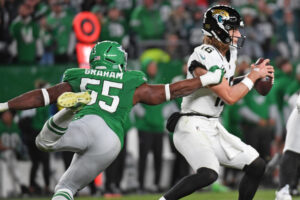As the NFL and NFLPA continue to work out terms for a new collective bargaining agreement (CBA), one of the more recent developments has been the possibility of an expanded schedule. With mounting opposition to four preseason games, owners seem willing to reduce those games, however, in doing so would like to see an 18-game regular-season or an expanded playoff field. The current CBA doesn’t expire until after next season, so at the earliest, the expanded schedule could not take effect until the 2021 season.
Pros of an Expanded NFL Season
Increase in Revenue
Perhaps the most obvious benefit of an expanded season is monetary gain. Simply put, more games equals more money, and everyone wants to make more of it. According to Fox Business, the NFL brought in about $16 billion in revenue during the 2018 league year. Other reports have indicated that the league’s goal is to earn $25 billion by 2027. One way to reach that goal is to play more games.
Regular-season attendance has declined across the league each year since 2016, so increasing the number of games could offset the decline in ticket sales. Aside from adding more games in which to sell tickets, placing additional regular-season or playoff games on the annual slate would generate more revenue from television, especially when new broadcasting deals are put into effect prior to the 2022 season.
Decrease in Preseason Games
One of the more controversial issues in today’s game is the number of preseason games. Many coaches and players alike feel that four preseason games are simply too much. This is largely due to the potential for injuries to occur. As a “trade-off” of sorts, owners are willing to reduce the preseason to two or three games in exchange for two more regular-season games or an additional round of playoffs. The preseason is likely to be a focal point when creating the new CBA, as a reduction of these games seems very possible.
Boost in Annual Viewership
The possibility of expanding the NFL season is huge when talking about television. Most preseason games are broadcast locally, and the ratings are much lower than those of regular or post-season games. Since the expansion proposal includes a reduction of preseason games, national markets, such as Fox and CBS, would theoretically gain additional broadcasts. More broadcasts mean more annual viewership, which ultimately means increased revenue. An increased number of broadcasts could be coming at the perfect time for large-market stations, as 2018 regular-season ratings increased for the first time since 2016, and playoff ratings were some of the league’s highest-ever according to Forbes.com.
Rewriting of the Record Books
From a business standpoint, setting records is always a good thing. Breaking records generates excitement and intrigue, both of which will always be good things for the league. An expanded season allows players more opportunities to go out and accumulate yards, tackles, and touchdowns. The chances that long-standing records could be broken become much more possible.
Take Eric Dickerson’s single-season rushing record for example. While playing for the Los Angeles Rams in 1984, Dickerson ran for 2,105 yards, averaging 131.6 yards per game. In order to post the same yardage number over an 18-game season, a player would only have to average 116.9 yards per game–almost 15 yards per game less than Dickerson did. That makes breaking this particular record, and others, much more attainable for today’s players.
Cons of an Expanded NFL Season
Increased Risk of Injury
One of the most obvious drawbacks of increasing the length of the season is that more injuries will occur. As unfortunate as they are, injuries are part of the game. With an increased concentration on injury prevention and rehabilitation, it’s possible that this may not be a significant factor. However, it’s more than likely that significantly more injuries would occur if the season were to be lengthened.
Over the past several seasons, players have become increasingly concerned with being put into situations where there is an increased risk of injury. Many players view four preseason games as “unnecessary” and as an injury trap. Thursday night games have even garnered player opposition in recent seasons due to the increased risk of injury. However, despite the potential for more injuries, the NFLPA has been willing to work with owners on lengthening the season per NFL.com.
Potential Difficulty Reaching New CBA
Outlining a new CBA has been a huge point of contention for the NFL and the NFLPA this off-season. The potential addition of more regular-season or playoff rounds would likely carry significant financial implications, and with that, could intensify negotiations. Players already want a greater share of league revenue, and if there is a significant increase in revenue, then players will want a greater share that much more.
Players have also expressed concern over the effects of injury on the game, and that figures to factor into CBA discussions, especially if the season were to be further elongated. Commissioner Roger Goodell had hoped that the new agreement would be completed by the start of the upcoming season. However, that possibility now seems virtually impossible. The process of building a CBA will become even more complicated if the season is to be lengthened.






